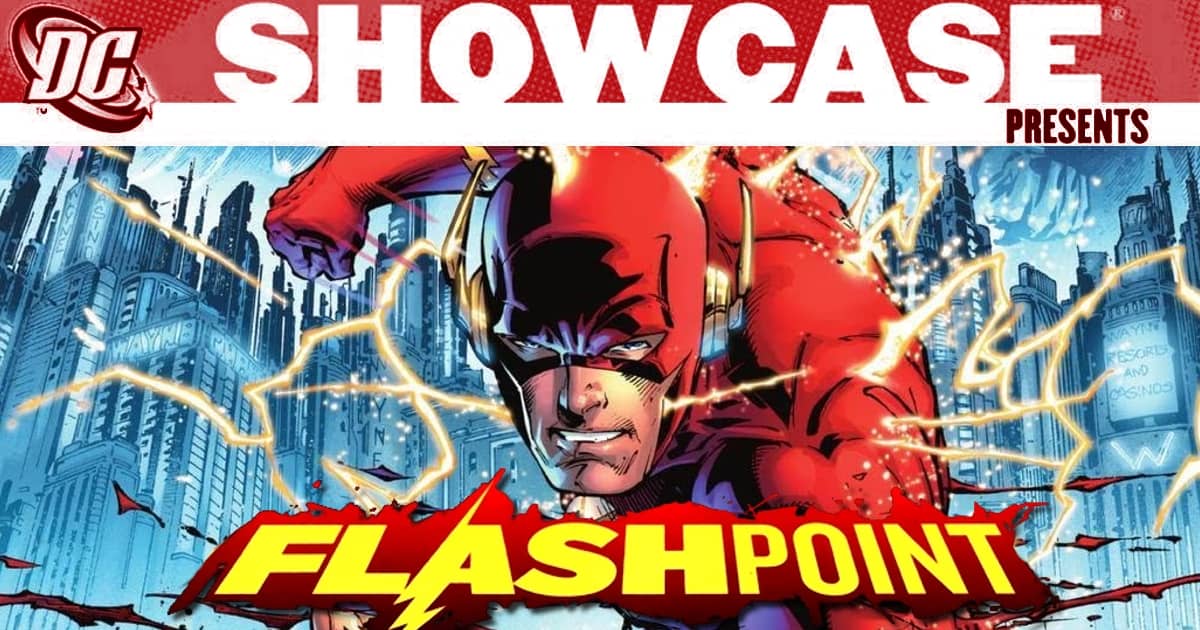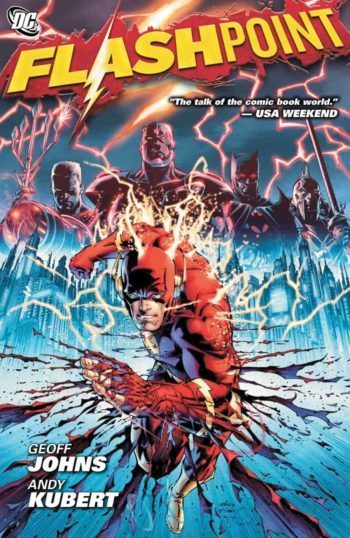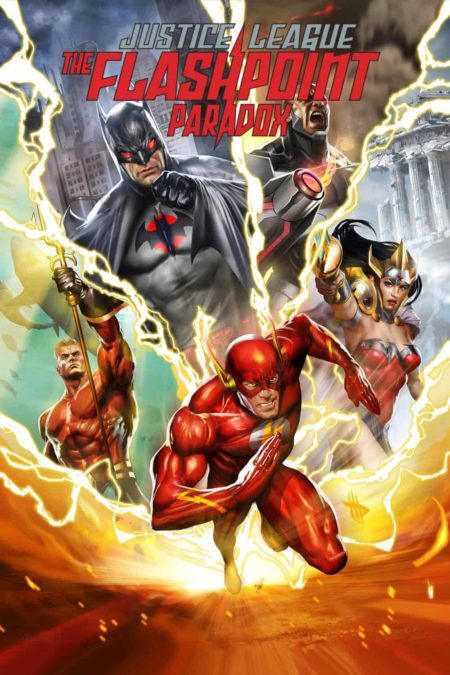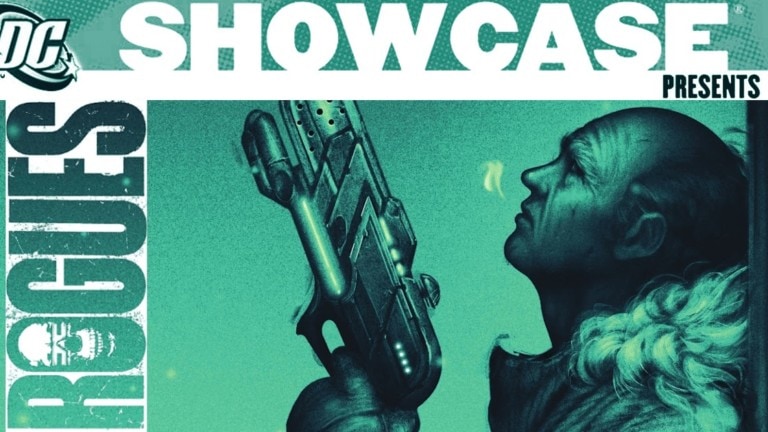DC Showcase: ‘Flashpoint’ Comic Review

Flashpoint is a special 2011 comicbook crossover by Geoff Johns and Andy Kubert. When Flash (Barry Allen) goes back in time to undo a personal tragedy, the repercussions affect the entire DC universe. The giant story was told as a 5-issue event series with over 50 tie-ins showing how the new timeline affected the other DC characters.
To this day, Flashpoint is considered one of DC Comics’ biggest events because it changed everything so much. This led to the creation of the New 52 universe, which canceled and rebooted every DC comic series (even Superman and Batman). More than ten years later, fans and industry insiders still debate whether relaunching the universe was a good editorial move, but there is no doubt that Flashpoint presented exciting potential for the DC Universe.
The appeal of the New 52 was that the new universe gave comic writers more room to create new stories, new origins, and new versions of old characters. The timeline reset was such an exciting idea that it quickly inspired three different adaptations. The first was the 2013 hit animated film Justice League: The Flashpoint Paradox, followed by the second adaptation in a 2016 arc of Grant Gustin’s The Flash TV series. The third version is coming this summer with The Flash film starring Ezra Miller, where the Flashpoint timeline will combine elements from other DC movies like Zack Snyder’s Man of Steel and Tim Burton’s Batman.
Each version of Flashpoint begins with a different prologue, but let’s start with the first and most important interpretation of the event: the comics.
Barry Allen’s decision to save his mom changes everything
The Flashpoint comic story tells us what happened when Barry Allen decided to go back in time and save his mother Nora, who had been murdered by Eobard Thawne a.k.a. Reverse Flash. Due to the lack of evidence, his father Henry Allen went to prison for her murder.
Even though Nora wasn’t originally supposed to die, her murder has become what some people in the DC universe theorize as a “fixed point” in time. Fixed points are events that are so important to the timeline that they cannot be changed. If this happens, then the natural flow of time will be affected. By going back in time, Barry created a whole new timeline in which his mom was alive, but he was not The Flash and the world just wasn’t the same.
At the beginning of the story, Barry wakes up at work and doesn’t know what happened. When he tries to leave, he sees his mother and is stunned that she is alive. He does not have his Flash Ring, nor his speed. Barry simply accepts that his mother is alive and doesn’t want to dwell further.
Barry tries to find his friends, but instead of finding familiar faces, he is surprised at every possible turn. This timeline’s version of Harley Quinn is called “Yo-Yo”, there’s a war between the Atlanteans and Amazons, and the Batman and Joker have become radically different characters. The relationship between Barry and the new Batman is one of the best parts of the event. Instead of getting that classic Bruce and Flash “kinda funny, kinda grumpy” vibe, this dynamic is more serious and hopeful about getting things right. Even when Barry learns that Reverse Flash is the cause of this, it further aggravates the situation.

Now we know that Thawne will do anything to stop Barry from reversing this timeline. But the final battle between the Atlanteans and Amazons is coming sooner than anyone expected. Fortunately, the new Batman helps Barry regain his speed and they do their best to stop the war. Along the way, they discover that there is another person who can help them. If you’ve read the comic before, you know who it is. If not, I won’t spoil it for you but just know that nothing is as it seems.
The artist responsible for all the visual designs of the Flashpoint comic is comic legend Andy Kubert. Kubert is known for his work on Batman, Sgt. Rock, Adam Strange, Captain America, X-Men, and Ghost Rider, among others. In Flashpoint, his art is really great. His pencils and Alex Sinclair’s expressive colors are what really bring these characters to life. In the fight scenes, we can see exactly what is happening in the background without losing focus on the main action. This is a really good, and sometimes even difficult, thing to achieve in comics, at least in my opinion.
Is Flashpoint for new readers?
Flashpoint is okay for new readers. With so much history and so many tie-ins, Flashpoint may sound unfriendly to new readers. But with all the changes that happen anyways, it’s simply enough to know who Barry Allen is, Batman’s origin story, and that’s all you need!
You can easily get through the main story of Flashpoint without having an extended knowledge of previous comics or watching every DC movie/series. All the characters in the Flashpoint timeline are different from their counterparts in the original universe. Many of the important events in DC history didn’t even happen in this timeline, so people like Hal Jordan and Lex Luthor aren’t who they are supposed to be. But the series is filled with small references to the legacy of DC, so the more you know the universe, the more you’ll appreciate the details.
An important thing to note about Geoff Johns’ Flashpoint is that Nora Allen’s death was actually a retcon he added. From 1956 to 2010, Barry’s mother had been alive and well in the DC universe, and Barry had lived through a peaceful childhood. Nora’s death wasn’t written until 2010 when Johns came up with the idea to send Thawne back in time to kill Barry’s mother, setting up the Flashpoint storyline and redefining Barry Allen forever.
For the best Flashpoint experience, we would recommend reading the following:
- The Road to Flashpoint
- The Flash: Rebirth (2010) #1-6
- The Flash (2010) #8-12 (“The Road to Flashpoint”)
- Flashpoint (2011) #1-5
- Recommended Flashpoint tie-ins
- Flashpoint: Batman Knight of Vengeance (2011) #1-3
- Flashpoint: Project: Superman (2011) #1-3
- Flashpoint: Wonder Woman and the Furies (2011) #1-3
- Flashpoint: Emperor Aquaman (2011) #1-3
- Flashpoint: Abin Sur – The Green Lantern (2011) #1-3
My history with Flashpoint
I am not a big fan of Flashpoint in the comic book or animated film. These are good stories, but as a Flash fan, I think the focus went somewhere it shouldn’t have during the telling of this story, getting lost in an all-out war and the end of the world.
The most important lesson for Barry here is to learn how to live with his past. As audience members, we need to find out what happened that led Barry to make the decision to save his mom, especially since he is responsible for causing the chaos of the new timeline. In addition, neither the comic nor the animated film show the lingering consequences for Barry after the universes were “fixed”.

Of course, the comic book version led to the creation of the New 52 universe, and the animated version led to the start of the DC Animated Movie Universe. But all this was to show us that after Barry “fixed” his mistake, he created something new without going into detail about his personal journey afterward. Everything settles into a new status quo and Barry doesn’t explore the deep consequences of his actions.
The animated film Justice League: Apokolips War tried to retroactively explain that Barry was the reason Darkseid could defeat the Justice League in the animated universe, but unfortunately that was the end of the story, not the beginning or middle.
CW’s The Flash TV series and the upcoming DC film
However, the TV version of Flashpoint is different. This adaptation takes place between the final episode of season 2 of The Flash and the first episode of season 3. When he loses his father, Barry Allen (Grant Gustin) is plunged into a grief that nearly destroyed him. In his desperation, he decides to go back in time and save his mother Nora (Michelle Harrison), preventing everything that happened to him.
In the TV version of the story, Barry lives in this new timeline for a few months. But after he started losing his memories of the main timeline, he realizes it’s a red flag to do something. Because of Barry’s actions, Kid Flash (Keiynan Lonsdale) dies in the new timeline, and that was the key thing that changed his mind. All he had to do was say “I want you to kill my mom” to Reverse Flash (Matt Letschner) and the entire timeline was “fixed” with the death of Nora once again.

But in contrast to the comic and animated film, this TV episode transformed Barry’s arc forever. The whole plot of season 3 was to show Barry that he is the one responsible for all the changes across the entire Arrowverse. If he thought an event was bad, the timeline replaced it with something even worse. This is the best Flashpoint adaptation for me because we could see Barry live with every change that was caused by saving his mom and then letting her die again. Nothing was as it seemed, not again.
If it weren’t for Flashpoint, we wouldn’t have gotten one of the best quotes about life and mistakes from Jay Garrick (John Wesley Shipp) himself, who says to Barry:
“Whenever you go back in time it (the Space-Time Continuum) breaks. You can reset the timeline, you can try to fix it. But no matter how hard you try, it’s never gonna be exactly how it was. […] That is the paradox of time travel, and also the paradox of life. I mean, if I only knew then what I know now. […] We’re not gods, we’re men, who, for whatever reason, have been given extraordinary abilities. The question you need to ask yourself is, what kind of hero are you gonna be? Are you just gonna take a do-over every time you make a mistake? Or will you live with them and move forward?”
This speech is really a great summary of everything that happened because of Barry and the journey to learn from his mistakes. He has to live with his choices and everything that has happened because he is not God.
The same will hopefully be true of the upcoming film The Flash, which will also adapt the Flashpoint story, but in a slightly different way. Barry (Ezra Miller) will go back in time and save his mother, but the main story will be different from those previous adaptations. I can happily say that in this one there will be no war between Atlanteans and Amazons, Michael Keaton will be Bruce Wayne/Batman again, and the final outcome will be different. But we will still have to wait to see it.
“These scars we have, make us who we are. We’re not meant to go back and fix them. Don’t let your tragedy define you.” – Bruce Wayne (Ben Affleck) in The Flash
My final thoughts on Flashpoint
The story of Flashpoint is a complicated and interesting take on the simple universal question, “What if we went back in time to fix the past?”. Everyone is interested in finding out why they couldn’t do it, and exploring the unintended consequences. Changing an entire fictional universe within an emotionally powerful story was definitely the way to go.
As a DC fan, I have to say that the original comic version of Flashpoint is not my favorite. That’s not to say it is not good, but it is simply different from all the other adaptations that came afterward. But by creating a story of long-term regret and questioning one’s own decisions, Geoff Johns and Andy Kubert created something that each of us can relate to at some point, even if we don’t have superpowers.
If you want to go to the cinema with an understanding of what Flashpoint is and why it is important to the DC universe, you can definitely read this comic book. If you prefer watching things instead of reading, go watch the animated version! But if you have the time and want a deeper exploration of Barry Allen’s emotional journey, I highly recommend watching the first 3 seasons of CW’s The Flash.
Have you read this comic before? What’s your favorite version of Flashpoint? Let us know on Twitter and remember to follow the site @MyCosmicCircus!
Check out our full list of DC Showcases here, including our review of Rogues, a special miniseries starring Flash’s villains! Also, check out our review of The Flash season 9 premiere!




